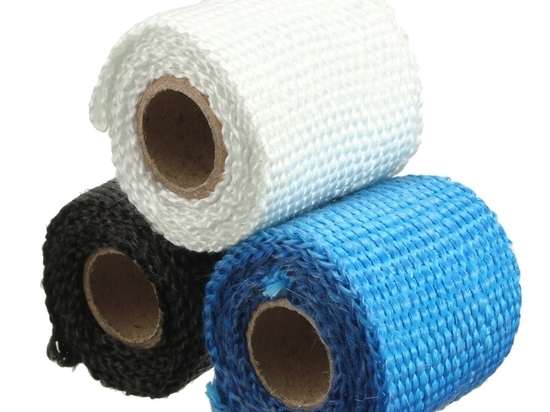
#Product Trends
Ceramic Fibre Tape – High-Performance Industrial Insulation
Ceramic Fibre Tape
Ceramic Fibre Tape is a premium thermal insulation product designed to perform in extreme temperature environments, offering unparalleled protection for both equipment and personnel. Made from high-purity ceramic fibres, this tape can withstand continuous exposure to temperatures as high as 1260°C / 2300°F, providing exceptional heat resistance, chemical stability, and thermal shock resistance. Its versatile applications in sealing, gasketing, and insulating make it a crucial component in industries requiring reliable and efficient high-heat solutions.
Key Characteristics:
High Temperature Resistance: Ceramic Fibre Tape can endure continuous exposure to temperatures up to 1260°C / 2300°F, making it ideal for high-heat applications such as furnaces, kilns, and industrial ovens.
Chemical Resistance: The tape exhibits excellent resistance to a wide range of corrosive chemicals, including acids, alkalis, and solvents. This makes it particularly valuable in environments where chemical exposure is inevitable, such as chemical plants and metal processing industries.
Low Thermal and Electrical Conductivity: Ceramic Fibre Tape’s superior insulation properties ensure it effectively contains heat and offers electrical insulation, making it perfect for both thermal protection and electrical safety in high-temperature environments.
Thermal Shock Resistance: The tape can withstand rapid temperature changes without cracking or degradation, which ensures its reliability in industries with fluctuating heat levels, such as steel production or glass manufacturing.
Applications & Use Cases:
Pipe and Cable Insulation: In industries such as oil and gas or petrochemicals, Ceramic Fibre Tape is applied to insulate high-temperature pipes and cables, protecting critical components from heat damage and energy loss. For example, in a petrochemical refinery, the tape is used to insulate piping systems carrying hot fluids, preventing heat loss and reducing energy consumption while ensuring safety for nearby personnel.
High-Temperature Sealing and Gasketing: Ceramic Fibre Tape is used in applications requiring superior sealing, such as sealing furnace doors, oven doors, and other high-heat appliances. In a steel manufacturing plant, the tape is employed to seal furnace doors, preventing heat loss and ensuring the furnace operates efficiently at peak temperatures. This helps maintain energy efficiency while reducing operational costs.
Protective Curtains: The tape is commonly used in the production of safety curtains that shield workers and equipment from direct heat exposure. In a foundry, Ceramic Fibre Tape is used to construct protective barriers that contain heat and provide a safe working environment by minimizing direct exposure to high temperatures. These curtains are essential in ensuring the safety of personnel working in hazardous, heat-intensive environments.
High-Temperature Gaskets: In the automotive industry, Ceramic Fibre Tape is used as gaskets for high-performance engines and exhaust systems. It prevents heat loss, improves engine efficiency, and protects vital components from damage caused by extreme heat. For example, it is used as a gasket for sealing exhaust manifold flanges in high-performance vehicles, where temperatures can reach extreme levels.
Industrial Ovens and Kilns: Ceramic Fibre Tape plays a crucial role in insulating industrial ovens, kilns, and reactors. In the ceramics industry, for instance, it is used to seal the doors and windows of kilns, ensuring heat is retained and preventing loss. This helps maintain consistent temperatures inside the kiln, which is critical for the production of ceramics and glassware.
Fire-Resistant Barriers: In fire-prone industrial sectors, such as the construction and mining industries, Ceramic Fibre Tape is used to create fire-resistant barriers. These barriers are crucial for preventing the spread of fire in emergency situations. In construction, for example, the tape is used as part of fireproofing measures in the construction of industrial buildings and high-rise structures, ensuring the building can withstand high temperatures in the event of a fire.





